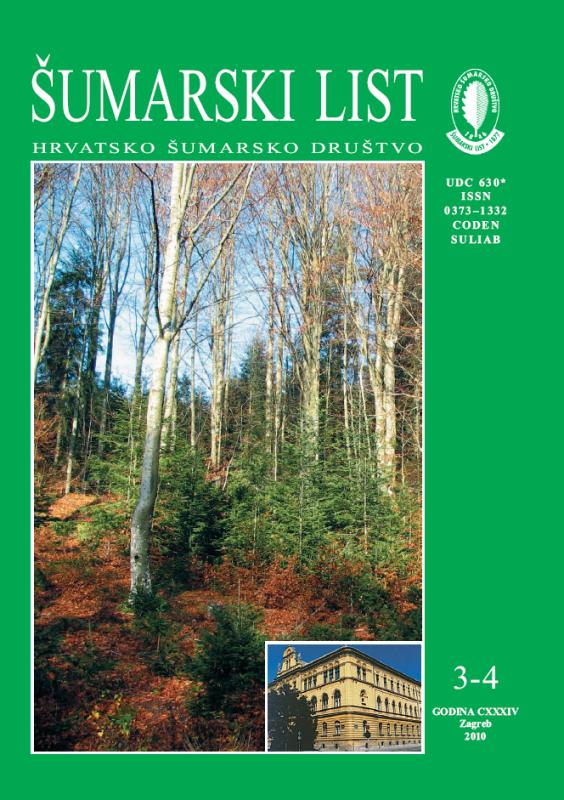| |
| RIJEČ GLAVNOGA UREDNIKA |
| |
|
|
| Branimir Prpić | |
| FOREST DAY, WORLD WATER DAYANDWORLD METEOROLOGICAL DAY
pdf
HR
EN
|
101 |
| |
| IZVORNI ZNANSTVENI ČLANCI |
| |
|
|
| Zečić,Ž., D. Vusić, M. Prka, S. Klepac | UDK 630* 377 (001) |
| Influence of Skidding Road Slope on Productivity of Skidding Timber Assortments with Tractor Timberjack 240C in Selective Forests
pdf
HR
EN
|
103 |
| Ostrogović, M.Z., K. Sever, I.Anić | UDK 630* 231 (001) |
| Influence of Light on Natural Regeneration of Pedunculate Oak (Quercus roburL.) in the Maksimir Forest Park in Zagreb
pdf
HR
EN
|
115 |
| Jambreković,V., R. Despot, M. Hasan | UDK 630* 841 (001) |
| The Overview and Evaluation of Phytosanitary System in CompaniesAuthorised for the Treatment and Marking of Wooden Material for Packaging in International Trade
pdf
HR
EN
|
125 |
| Pezdevšek Malovrh, Š., L. Zadnik Stirn, J. Krč | UDK 630* 682 (001) |
| Influence of Ownership and Property Structure on Willingness of Private Forest Owners to Cooperate
pdf
HR
EN
|
139 |
Summary: Private forest management is, particularly in Slovenia, far from optimal. The reason lies in the diversity of ownership and property structure. In addition, Slovenian private forest owners are not adequately organized and associated to manage their forests. The willingness of private forest owners to cooperate was evaluated using the questionnaires. The sample (n=700) included equal shares of associated and non-associated owners. Forty-six percent of questionnaires were returned. The results of the survey analysis showed that 39.1 % of private forest owners were members of forestry associations (associated), 19.9 % owners showed willingness to cooperate i.e. to join a forestry association and 41.0 % of the sampled forest owners were unwilling to cooperate. Based on the data obtained through the survey we have studied the relationship between ownership and property conditions in regard to the willingness of forest owners to cooperate. The Chi-square test showed the statistical significance of the relationship between the size of forest property and the willingness of owners to cooperate. Further, the results of multivariate logistic regression showed that it is necessary to search for private forest owners who are willing to cooperate in the group of forest owners who are younger than 50 years, who own more than 10 ha of forest land and live in common household with the co-owners.
Key words: bivariate and multivariate analysis; forest owners’ cooperation; logistic regression; ownership and property conditions; private forests; statistical models |
| |
| STRUČNI ČLANCI |
| |
|
|
| Posarić, Darko | UDK 630* 440 + 450 |
| The most Important Reasons for the Loss of Pedunculate Oak (Quercus roburL.) from Forest Stands up to First Thinnings
pdf
HR
EN
|
151 |
| Ivančević, Vice | UDK 630* 902 |
| The Rich Museum Tradition of Croatian Forestry Continues - On the occasion of opening the Forestry Museum in Krasno, the first in our country
pdf
HR
EN
|
159 |
| Roša, Jadranka | UDK 630* 892 |
| Steps to the Eco-label for Therapeutical Herbs andAromatic Plants
pdf
HR
EN
|
169 |



